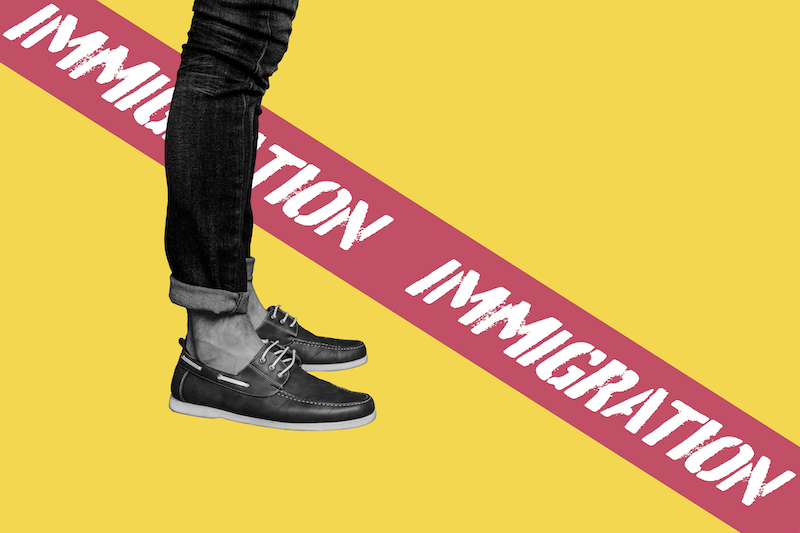The celebration of Migrant and Refugee Sunday in the Catholic Church has been a minority activity this year. The times do not favour it. It’s not that there are few migrants and refugees to bother about. The difficulty is that they are many and growing.
 People who are doing it hard, as so many Australians and others are, in a time of gross inequality and economic pressure, readily see migrants and refugees as a cause of their own discontents and turn on them. In the United States, Great Britain and in Europe we have seen how dangerous this behaviour is, how it can be inflamed by politicians and by social media, and how it threatens peace and civil order.
People who are doing it hard, as so many Australians and others are, in a time of gross inequality and economic pressure, readily see migrants and refugees as a cause of their own discontents and turn on them. In the United States, Great Britain and in Europe we have seen how dangerous this behaviour is, how it can be inflamed by politicians and by social media, and how it threatens peace and civil order.
The same effects of economic pressures, ecological changes and armed conflicts are also driving more people to leave their homes and to seek safety and a decent life. Many are displaced by war, discrimination and famine in their own nations. Many seek protection in other nations. People displaced in Myanmar and Gaza and Sudan attract the most attention, but are only a few of those fleeing from violence and poverty.
In prosperous times many people in developed nations are sympathetic to refugees and migrants and welcome them into their own societies. In hard times, however, xenophobia spreads and is exploited by politicians who vilify refugees and demand that the nation be closed to immigrants. This is notable in the United States and in many European nations, where small radical groups protest violently against immigrants and refugees, as well as against local minority groups. Governments often respond by cutting immigration and excluding refugees.
Australia, which had already adopted punitive measures to prevent people seeking protection, has come under similar pressure. That is not surprising. People who struggle to find accommodation or to keep work can easily be led to see as threats people coming to Australia. They believe that governments should solve local problems first and only then admit others to Australia. Although such opinions may not make economic sense and are self-centred, they are understandable. The conduct of politicians and ideologues who spread false rumours against people from other cultures, stir up violent demonstrations, and depict refugees and immigrants from unfavoured nations as dangerous people who should be locked up, is less forgivable.
In these times it is important to plead the cause of refugees. It is even more important to open our minds and hearts to all the persons who are doing it hard, and not to barrack for some of them while lumping together others as things and not as persons. As we reflect on the hardships which many people who live in Australia must bear, feel compassion for them, and argue for change in our unequal economy, our hearts should also open to the stories of people who have been forced from their homes and who seek protection and a new life in Australia. Australians who do it hard and refugees are not competitors but our brothers and sisters.
In hard times it is easy to forget people. Migrant and Refugee Sunday is a time for remembering. The need to remember and the decencies of remembering are enshrined in war memorials and in phrases such as the one attached to the Holocaust, ‘Lest we forget’. Remembering is also central to the Abrahamic religions, whether focused on the liberation of the Jews from Egypt, the death and rising of Jesus and the martyrs, or the revelation made to Muhammad. The need to remember has enriched languages and created alphabets.
In recent weeks the local services in Gaza have emphasised the importance of remembering by taking precious time to gather and publish the names of the 34,000 people known to have been killed in Gaza. They may no longer be seen as numbers, ciphers in military and strategic calculus, but as persons. Each has a name, each is unique and precious. They share that dignity with each person who lives with hunger, illness and fear in Gaza, in Mynamar, in Sudan and central America, and with each person who has escaped beyond national borders to seek life for themselves and for their families in other nations.
The call to remember extends also to our personal and national history. For all Australians that includes the immigration to Australia, forced or voluntary, of our ancestors and and the hope of a better life that they nurtured. For many of us this history included flight from famine in Ireland, from poverty, from religious and ethnic discrimination, or from the effects of war. Our history also extends to all the people whom at different times we have excluded – Asians, Africans, Jews and even our First Peoples. We all own a history that evokes gratitude, pride and shame. Migrant and Refugee Sunday invites us to think and act generously.
Andrew Hamilton is consulting editor of Eureka Street, and writer at Jesuit Social Services.
Main image: Depositphotos.com